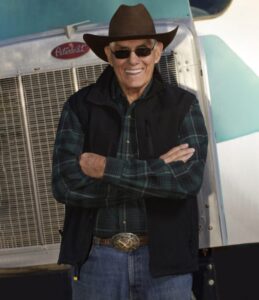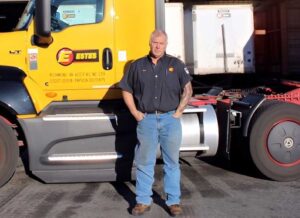BENTONVILLE, Ark. — Trucking has never been an easy business, but the recent degradation of supply chain combined with a lack of drivers has put unprecedented pressure on profitability as companies struggle to deliver goods on time and safely.
One new tech company, Arkansas-based Fr8relay, is looking to change that scenario. Offering a fresh perspective on logistics and route management, the company’s software looks to ferret out inefficiencies related to downtime, speeding delivery along the way while reducing wear and tear on drivers, according to company founder Aayush Thakur.
“The technology is essentially a play on combining the long-haul trucking with relay racing,” Thakur noted. “In relay racing, the runners hand off the baton every 100 meters to the next runner. We’re applying the same principle to building trucking gains across the country.”
The concept looks to maximize the 11-hour driving window allowed by federal law before drivers take a mandatory 10 hours off. Traditionally, the driving window has been utilized in a straight line from Point A to Point B. Fr8relay seeks to use these hours more efficiently by creating a hand-off of trailers along a route, similar to the way the Pony Express riders of old distributed mail in a relay fashion.
“There is enough cargo that is moving so that we can match drivers every four to five hours so that they swap their trailers and head back home,” Thakur said. “Meanwhile, the trailer keeps moving and is not sitting roadside because the driver is forced to pull over and rest.”
Through coordinated logistics, Fr8relay makes it possible for any distance haul to be made in real time by coordinating multiple drivers along the route in such a way that no one driver exhausts his or her allowable hours. It also allows more freight to be hauled in that window on trucks returning to point of origin.
“One example we give regularly is a lane from Chicago to Dallas; that is usually a 14-hour drive,” Thakur said. “Today, you can do a conventional one-driver model where you have a driver drive 11 hours, sleep for 13 and then drive the remaining three hours. That would be a 27-, 28-hour drive.
“In our model, you can cover it in just 14 hours,” he continued. “A driver will start to travel, drive four hours, meet someone in Springfield, hand over the trailer (and) take that other trailer back to Chicago while the trailer that was handed off in Springfield moves farther down to say, Tulsa. Then an exchange happens there, and that trailer again moves to Dallas.”
The concept of relays is not new, but is currently practiced only sporadically in the trucking industry, Thakur said, adding that Fr8relay provides scalable technology that automatically implements relays as an integrated part of a company’s logistics and scheduling.
In addition to maximizing efficiencies, the technology provides a series of equally compelling ancillary benefits, he said.
For one thing, it gives freight companies a new tier of delivery service for which they can charge a premium. It also helps companies make the most of available drivers at a time when the industry is struggling to attract new workers behind the wheel. And third, it makes the job more attractive to veteran and prospective drivers alike by allowing more runs to end at home.
This third benefit is what excites Thakur’s business partner and wife, Deme Yuan, the most.
“Aayush is the visionary and the tech guy, but he lured me in because he knows that what I care about is the potential social impact that this can have for truck drivers,” Yuan said. “There are a lot of harsh conditions that can be improved with this model that are transformative for truck drivers and their families.
“It also makes the job more accessible,” she added. “There are all sorts of barriers to female drivers in the industry, for instance, whether it’s being taken away from traditional gender roles of having to care for small children or aging parents, or fears about potential gender-based violence when you’re isolated.”
Thakur filed a patent for his technology in 2014 and, upon receiving it four years later, jumped full-time into building the company. In 2020, the couple moved from Memphis, Tennessee, to Bentonville, Arkansas — a locale that is not coincidentally home to two of the largest logistics entities on the planet, J.B. Hunt and Walmart.
“The big guys already have their technology systems built,” Thakur said “Our technology would be simply a plug-in module where you connect our software and upload a list of drivers and trucks; (then) we create a schedule dynamically for them, enabling a relay. If something changes, based on driver availability or a load gets canceled or something, then that schedule will automatically update and notify the stakeholders.”
The system even tracks weather in real time to anticipate bottlenecks and lane closures. Thakur said the technology not only works with large fleets, but it can also help owner-operators similarly maximize profits.
Finally, there’s an economic impact for communities that are currently bypassed by the trucking industry, but the location of which makes them an ideal relay station. In 2021, Fr8relay was awarded a U.S. Department of Agriculture (USDA) small business innovation grant to study the potential for creating just such employment opportunities in rural areas.
“We are talking to rural communities along interstates where our exchange locations will be to see if they would like to partner with us for the next phase of the USDA grant so we can explore the mechanics of establishing a rural hub for exchange,” Thakur said. “If that works out, we want to commercialize it in 2023 and onward. That is something that we are really passionate about.”
The company will begin pilot programs this year. Both Thakur and Yuan admit that a key cog in the success of Fr8relay is trucking companies being willing to approach logistics from a different angle than in the past — and that such thinking is not assured. But, they said, the multiple potential benefits of the freight relay technology make a compelling case to do so.
“We understand how there would be some paradigm shift for some drivers,” Yuan said. “But when you realize that you have this asset that could be producing more revenue, you’re more likely to make that choice. Plus, this is a play to make the lives of drivers better while making it possible for cargo to be delivered in half the time, because it’s not sitting on the roadside when the driver is resting.”
Thakur says he believes the system will be appealing to both drivers and owner-operators.
“It is a win-win scenario for all the stakeholders,” Thakur said. “It’s not like it’s written in scripture that drivers need to spend their night at gas stations. You can still move cargo interstate across the country with coordinated local drivers who are driving four to five hours out of their home base and getting back home. That is where want this to go.”
Dwain Hebda is a freelance journalist, author, editor and storyteller in Little Rock, Arkansas. In addition to The Trucker, his work appears in more than 35 publications across multiple states each year. Hebda’s writing has been awarded by the Society of Professional Journalists and a Finalist in Best Of Arkansas rankings by AY Magazine. He is president of Ya!Mule Wordsmiths, which provides editorial services to publications and companies.











